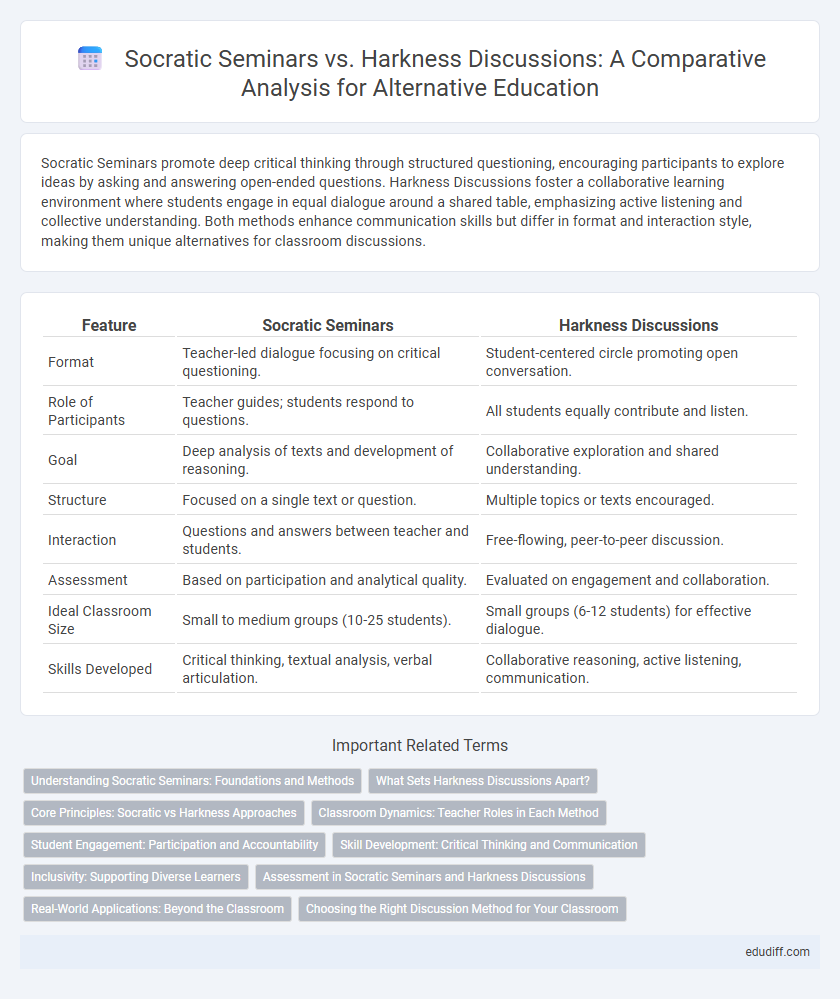Socratic Seminars promote deep critical thinking through structured questioning, encouraging participants to explore ideas by asking and answering open-ended questions. Harkness Discussions foster a collaborative learning environment where students engage in equal dialogue around a shared table, emphasizing active listening and collective understanding. Both methods enhance communication skills but differ in format and interaction style, making them unique alternatives for classroom discussions.
Table of Comparison
| Feature | Socratic Seminars | Harkness Discussions |
|---|---|---|
| Format | Teacher-led dialogue focusing on critical questioning. | Student-centered circle promoting open conversation. |
| Role of Participants | Teacher guides; students respond to questions. | All students equally contribute and listen. |
| Goal | Deep analysis of texts and development of reasoning. | Collaborative exploration and shared understanding. |
| Structure | Focused on a single text or question. | Multiple topics or texts encouraged. |
| Interaction | Questions and answers between teacher and students. | Free-flowing, peer-to-peer discussion. |
| Assessment | Based on participation and analytical quality. | Evaluated on engagement and collaboration. |
| Ideal Classroom Size | Small to medium groups (10-25 students). | Small groups (6-12 students) for effective dialogue. |
| Skills Developed | Critical thinking, textual analysis, verbal articulation. | Collaborative reasoning, active listening, communication. |
Understanding Socratic Seminars: Foundations and Methods
Socratic Seminars are grounded in the dialectical method developed by Socrates, emphasizing critical thinking through questioning and dialogue rather than direct instruction. Participants engage with open-ended questions to collaboratively explore complex ideas, fostering deep comprehension and reflective thinking. This method prioritizes evidence-based discussion and encourages participants to analyze texts and articulate their reasoning clearly within a structured, learner-centered environment.
What Sets Harkness Discussions Apart?
Harkness Discussions set themselves apart through their emphasis on egalitarian dialogue, where students sit around an oval table to encourage open, student-led conversation without a dominant teacher role. Unlike Socratic Seminars, which often center on teacher-guided questioning to probe critical thinking, Harkness fosters collaborative exploration and peer-to-peer interaction, promoting deeper engagement and shared responsibility for learning. The method enhances communication skills and critical analysis by valuing each participant's voice equally in shaping the discourse.
Core Principles: Socratic vs Harkness Approaches
Socratic Seminars center on questioning and critical thinking, encouraging participants to explore ideas deeply through guided dialogue while emphasizing the teacher's role in facilitating discussion. Harkness Discussions promote student-led conversations around a large table, fostering collaboration, equal participation, and shared responsibility for learning. Both approaches prioritize active engagement but differ in structure, with Socratic Seminars focusing on inquiry-driven dialogue and Harkness Discussions emphasizing democratic, peer-driven interaction.
Classroom Dynamics: Teacher Roles in Each Method
In Socratic Seminars, the teacher acts primarily as a facilitator who guides discussion through carefully crafted questions, encouraging students to explore ideas deeply and critically without dominating the conversation. Harkness Discussions position the teacher as a silent observer and equal participant sitting among students, promoting student-led dialogue and collaborative inquiry. These divergent teacher roles shape classroom dynamics by either structuring the dialogue or fostering an egalitarian learning environment where students take ownership of their educational experience.
Student Engagement: Participation and Accountability
Socratic Seminars foster student engagement through structured questioning that demands active listening and critical thinking, ensuring every participant contributes thoughtfully to the discussion. Harkness Discussions promote accountability by emphasizing collaborative dialogue around a shared table, encouraging equal participation and ownership of ideas among students. Both methods enhance student engagement by requiring consistent preparation and encouraging reflective responses, but Harkness tends to create a more democratic learning environment.
Skill Development: Critical Thinking and Communication
Socratic Seminars enhance critical thinking by encouraging open-ended questioning and in-depth analysis of texts, fostering a deeper understanding of complex ideas. Harkness Discussions promote collaborative communication skills and active listening through student-led dialogue around a shared table, emphasizing equal participation. Both methods develop critical thinking and communication but differ in structure, with Socratic Seminars focusing on dialectical reasoning and Harkness Discussions prioritizing peer interaction.
Inclusivity: Supporting Diverse Learners
Socratic Seminars promote inclusivity by encouraging every participant to contribute through open-ended questions that invite diverse perspectives and thoughtful reflection. Harkness Discussions emphasize equal participation around a round table, creating a collaborative environment where all learners, including those with different learning styles and backgrounds, feel valued and heard. Both methods foster supportive dialogues that accommodate varied cognitive abilities and cultural experiences, enhancing engagement for diverse learners.
Assessment in Socratic Seminars and Harkness Discussions
Assessment in Socratic Seminars emphasizes evaluating students' critical thinking, depth of understanding, and ability to support arguments with textual evidence through rubrics focused on dialogue quality and analytical skills. Harkness Discussions prioritize assessing collaborative engagement, equitable participation, and the ability to build on peers' ideas, often using observational checklists and peer feedback to measure group dynamics and communication proficiency. Both methods use formative assessments tailored to encourage reflective thinking and continuous improvement in discussion-based learning.
Real-World Applications: Beyond the Classroom
Socratic Seminars emphasize critical questioning and dialogue that sharpens analytical thinking, making them ideal for law, ethics, and philosophy professions where argument evaluation is crucial. Harkness Discussions foster collaborative problem-solving and collective insight, benefiting fields like business strategy, education, and healthcare where teamwork drives innovation. Both methods equip students with communication skills essential for real-world decision-making and leadership roles.
Choosing the Right Discussion Method for Your Classroom
Choosing the right discussion method depends on your classroom goals and student dynamics; Socratic Seminars emphasize structured questioning to develop critical thinking, while Harkness Discussions foster collaborative dialogue through equal participation around a roundtable setting. Consider Socratic Seminars for in-depth textual analysis and teacher-led inquiry, and opt for Harkness Discussions to promote student-led exploration and interpersonal communication skills. Evaluating your objectives for engagement, student independence, and discourse style will guide the optimal selection between these two influential pedagogical approaches.
Socratic Seminars vs Harkness Discussions Infographic

 edudiff.com
edudiff.com